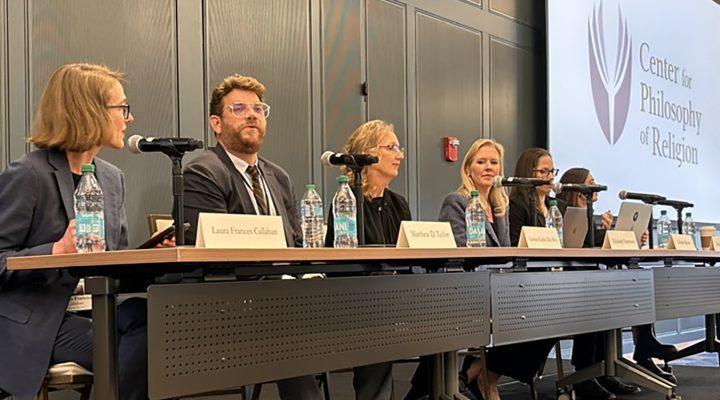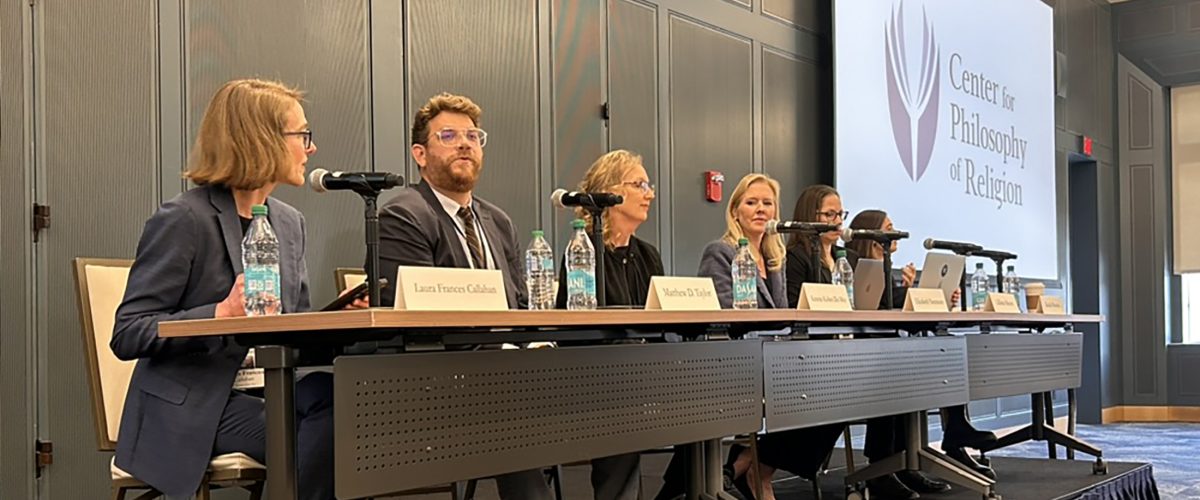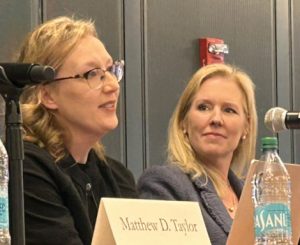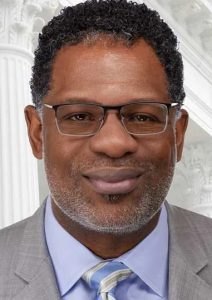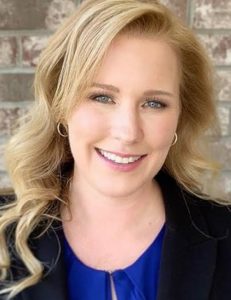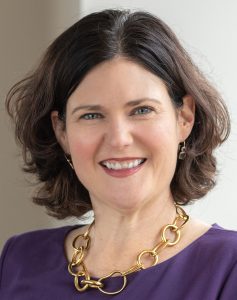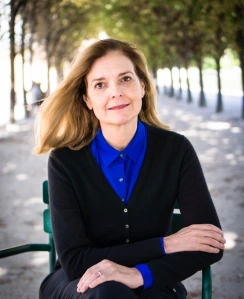As I walked through the snow toward McKenna Hall at Notre Dame University, I imagined the next 12 hours would include hard truths and valuable insights from professors and pundits about the reelection of Donald Trump and the Republican takeover of Congress.
The 2024 Election Postmortem was hosted by Notre Dame’s Center for Philosophy of Religion. It sought to answer three main questions: What happened, what to watch for in the days ahead, as well as planning, partnerships and practical steps for the next four years.
Notre Dame’s Center for Philosophy of Religion focuses on bringing philosophy and theology into a conversation to provide insights for every day, normal people.
“If there’s any issue where we might expect Notre Dame would have a voice that we hope the rest of the country and the world would listen to, it’s on the question of faith and religion and how it relates to democracy,” said David Campbell, professor of American Democracy and director of the Notre Dame Democracy Initiative.
And to be sure, the next 12 hours did not disappoint. The event, which was envisioned and organized by Kristin Du Mez, brought together a unique blend of professionals exploring three well-balanced themes that combined honesty and hope. But perhaps the most meaningful expression of Notre Dame’s voice at this event was its hospitality.
Reaching out
One of my earliest memories in life was watching a Notre Dame football game at my grandparents’ house in 1987. The reason I remember this game so clearly is that I yelled, “I hate Catholics!” And suddenly, my dad was informing me that my aunt, who was in the room, was a Catholic.
Of course, I had no idea what Catholics were. But my independent Baptist parents were recent graduates of Bob Jones University, which is a fundamentalist evangelical university whose founder called the pope the Antichrist. So I imagine my hateful outburst toward Catholics was learned at home.
Up until 2015, I was a fully committed evangelical Christian nationalist who never would have imagined sitting under the teaching of a Catholic. So in a sense, this conference felt like a group of people having a conversation about how to reach out to my past self.
My journey of walking away from Christian nationalism and opening toward my neighbor began with a spiritually healing journey of self-awareness that fostered a love of neighbor as self. The first seeds of this journey were planted when I was required to read a book called Reaching Out, by Henri Nouwen, who taught at Notre Dame in the 1960s. And for me, experiencing the 2024 Election Postmortem felt like the embodiment of Nouwen’s reflections on hospitality.
Hospitality in an academic setting
In evangelical spaces of gender binaries, hospitality is typically considered the work of women, while men provide the entirely different discipline of teaching. But in Nouwen’s theology, hospitality is about more than setting out donuts and coffee. It is about postures within, toward and among one another. And for Nouwen, hospitality is crucial for academics.
Nouwen defined hospitality as “the creation of a free and friendly space where we can reach out to strangers and invite them to become our friends.” As I told Kristin Du Mez after the event, it felt like being with old friends despite so many of us never having met.
Much of this was due to who Du Mez and Notre Dame brought together for the event. As Nouwen writes, the affirmation of one another provided in hospitality “often means just bringing the right persons together or setting apart time and place where more thinking can be done.” That’s exactly what the 2024 Election Postmortem provided.
I mentioned to Robert P. Jones between sessions that it’s interesting how many of these events are being hosted by academics, and yet they’re connecting with people who aren’t academics. Jones said given what the academics are noticing in their research, they’re realizing conversations need to be had and these events are how they know to have them.
But despite having the knowledge about data the rest of us don’t have, the academics Du Mez has been gathering aren’t driven by hierarchy, but rather by hospitality. As Nouwen suggests, “Teachers who can detach themselves from their need to impress and control, and who can allow themselves to become receptive for the news that their students carry with them, will find that it is in receptivity that gifts become visible.” He suggests a teacher can be “a receiver who can help the students to distinguish carefully between the wheat and the weeds in their own lives and to show the beauty of the gifts they are carrying with them.”
At the 2024 Election Postmortem, the professors and pundits on the three panels not only shared their insights but invited the insights of the guests. For one thing, even something as subtle as referring to us as “guests” was a way of fostering a feeling of having a table conversation. Also, our questions and insights during the discussions were clearly valued, as if we were offering a gift to the hosts as well. And as Nouwen points out, when that happens, “the distinction between host and guest proves to be artificial and evaporates in the recognition of the new found unity.”
A unity of diverse backgrounds and perspectives
One of the most beautiful moments of the conference for me was a conversation I had around a table with a half dozen of the panelists and guests. Three of the women had no church background, one of the men was a pastor, another was a Notre Dame professor, and two of us came from conservative evangelical backgrounds.
We talked about how our different families approached the holidays during our childhoods and how our current experience of Christmas is affected by the wonders and wounds of our childhoods. We shared stories of hell houses, altar calls, yoga and carefully designed Bronze Age figurines gifted by a hippy mom. We laughed and lamented through the complexity of it all.
None of us tried to convert the other to our theology or politics. We were simply present together in the stillness of stories. And although most of us around the table wouldn’t be interested in attending the institutional church the professor or the pastor led, we were together in what Nouwen would call a “friendly emptiness where strangers can enter and discover themselves as created free; free to sing their own songs, speak their own languages, dance their own dances; free also to leave and follow their own vocations.”
Why? Because, “Hospitality is not a subtle invitation to adopt the lifestyle of the host, but the gift of a chance for the guest to find his own.”
In this space, around this table, I never would imagine yelling out like I did as a 5-year-old fundamentalist, “I hate Catholics!” So why does white evangelicalism, as evidenced in the 2024 election, produce the fruit of hierarchy rather than hospitality?
White Christianity’s wound of belonging
While many of these conversations focus on white evangelicalism, the conference focused on all of white Christianity.
As Jones pointed out, “It is essentially white Christian groups, all three of the big white Christian groups that we tend to parse out in social sciences — white evangelicals, white Catholics, and white nonevangelical Protestants — who all were in majority support for Trump in the election.” Jones noted two-thirds of white Christians voted for Trump, while two-thirds of nonwhite Christians voted for Kamala Harris.
And while the speakers provided a lot of analysis as to how these divides played out, one of the surprising themes of the conference was how white Christians have a wound related to belonging.
“A large swath of the Christian culture from which I came is experiencing a group humiliation.”
Elizabeth Neumann, who has two decades of experience working in homeland security, said: “A large swath of the Christian culture from which I came is experiencing a group humiliation. In extremism, the reason why people are vulnerable to extremist ideology is because they’re experiencing some sort of crisis of belonging or significance.” She later added that to repair what’s gone wrong, “We’ve got to be providing that true and authentic belonging.”
According to Rachel Brown, founder and executive director of Over Zero, humans make decisions based on our perception of reality, which is shaped by “what groups do I belong to, who do I trust and not trust.”
Jim Wallis, director of the Center on Faith + Justice at Georgetown University, quoted a scholar who said, “The answer to the violence is belonging and meaning and purpose.” Then he asked, “Isn’t that what you all do in faith communities?”
So where could white Christianity’s crisis of belonging be coming from?
White Christianity’s status threat
For Christopher Parker, professor of political science at the University of California, Santa Barbara, the crisis white Christians are experiencing is due to their loss of power in race and gender hierarchies going back centuries.
“The social psychology of the MAGA movement is status threat,” Parker said. “Status threat is a social psychological component of a broader theory of reactionary power grids in which dominant groups are threatened by social progress and seek a return to the hierarchy of the status quo ante. Status-threatened people, moreover, read cultural changes in American society as existential threats to their way of life, not to their pocketbook, but to their way of life and to their cultural dominance, that is to say their relative social prestige.”
“Status-threatened people read cultural changes in American society as existential threats to their way of life.”
In other words, as Black people became free from the boot of white slaveowners, and then as women became free from the boot of their husbands, the world of white Christian men in particular was coming to an end. And as their world began to crack, white men began to wonder if the world itself was coming to an end.
“Status threat, apocalypticism and negative partisanship — these things all work together,” Jones explained. “So if you think the other party is literally a tool of the devil, and if they get into power it is literally going to be the end of the world, that’s a pretty strong cocktail for only considering one party. It’s also correlated with support for political violence when you believe those things.”
Responding in violence
Du Mez shared how the polarizing rhetoric of “us vs. them” that is so prominently evident in white Christianity’s persecution complex drives radicalization. And with the reelection of Trump, she said, it’s “going beyond mere rhetoric into retribution.”
Neumann explained how “violent extremism is when an in-group perceives a threat to their success or survival by an out-group, and draws a conclusion that the only solution is hostile action.” She said this violence can exist on a spectrum that extends from bullying to genocide.
Katherine Stewart, author of The Power Worshippers, said the fear from lost status “tells them any measure, no matter how radical, is necessary to save the country. This primes them for embracing an authoritarian leader who will break the rules and exact retribution on their perceived enemies.”
Matthew D. Taylor, author of The Violent Take It By Force, shared how examples from countries such as Poland, Turkey, Hungary, India and Russia may provide insights into a spectrum of possibilities related to violence that a religious nationalist movement under Trump’s second term could pursue.
White Christianity’s broken culture
With so much focus on white Christianity’s wound of belonging and turn toward violence, the obvious question I began to consider was how white Christian communities talk about belonging and violence in their weekly gatherings.
After all, Neumann said, “If we want to fix the politics, we have to fix the broken culture.” And Amanda Tyler, executive director of Baptist Joint Committee for Religious Liberty, said, “One important strategy is for white Christians to grapple with ways in which we ourselves have perpetuated Christian nationalism, not just in the culture at large, but also in our religious spaces.”
“There is a theology behind Christian nationalism too,” Tyler added. “And it is one that in many ways is inherent in what white American Christianity itself is.”
White Christians will tell you their belonging is founded in the gospel. But while that sounds like hope, we have to wonder what kind of gospel.
As I’ve attended Christian nationalist worship rallies this year, I’ve noticed how they all combine songs and liturgies about the Canaanite conquest with theologies of spiritual warfare that promote justice as violent retribution against anyone who won’t submit to their theology and politics.
But while many of these rallies may seem extreme, the theology they promote is essentially the theology celebrated in many seemingly nonextremist white Christian churches on any given Sunday.
Children’s church programs tend to focus on exciting stories in the Bible to engage the kids. These stories tend to be about the children of Israel conquering Canaan or defeating giants. Their songs combine motions with exciting melodies while invoking imagery of being obedient soldiers who never doubt as they march, fight battles, make walls fall down, smash the devil’s head, decapitate giants and live in constant happiness as they conquer their enemies.
Then in the adult worship service, they’re singing songs about the Cross, which is rather violent. And they’re either explicitly mentioning or silently implying that those who won’t submit will end up in hell forever, which also is kind of violent.
“The white Christian worship space is one where violent retribution is present everywhere.”
Whatever one thinks about atonement theories or the afterlife, the white Christian worship space is one where violent retribution is present everywhere. Sure, they come away from their church services feeling refreshed and bonded with one another in unity. But the narratives that bind them to one another in belonging are stories of hierarchy that celebrate justice as violent retribution against any neighbor who won’t submit, rather than stories of wholeness that celebrate justice as liberation and healing from the wounds that are caused by empire.
Rachel Brown observed: “The group that’s being constructed as ‘other’ is portrayed inherently and already guilty, not just for an action but an entire group is inherently for an action of one or a few people. Often, maybe some really egregious crime perpetrated by one person with a particular identity is blown up to say that whole group is guilty.”
But while Brown may have been talking about politics, her statement is totally consistent with white Christian theology. After all, the hierarchical theology of conservative evangelicalism says every human is inherently and already guilty and deserving of infinite violence due to the original sin of Adam in the garden of Eden. Because Adam sinned, the whole group of humanity is guilty and deserves to burn as individuals alone forever.
It’s no wonder given this theology that white Christianity would have a broken culture Neumann describes as “a culture that is hopeless and in despair and lonely.”
Investing in content creation as hospitality
Henri Nouwen says: “The church is not an institution forcing us to follow its rules. It is a community of people inviting us to still our hunger and thirst at its tables.”
If we’re going to still the hunger and thirst of white Christians who are lashing out in violence due to losing their status, we’re going to have to heal the wounds they may not be ready to deal with or even be aware they have because to them, they’re simply practicing basic, biblical Christianity.
So on one hand, much of this work of healing is going to have to happen at the micro level, where we sit at tables with neighbors and move from hostility toward hospitality that gives space for differences that value the belonging and worth of everyone.
But on a macro level, those of us in the middle and on the left need to start thinking more strategically about how to counter the narratives that are being propagated by rightwing fake news outlets.
As Tim Whitaker of The New Evangelicals pointed out, the top four Christian nationalist voices (Daily Wire, PragerU, The Blaze, and TurningPoint USA) have a combined 39.7 million followers and $394 million in funding, while the top seven alternatives have just 2.7 million followers and $39 million in funding.
According to journalist Anne Nelson, “There’s been a massive hollowing out of the American journalism industry. The United States is on track to lose two-thirds of its newspaper journalists in 2025.”
Instead of reading trusted journalists who have decades of experience in deciphering the news, the top two news apps today are X and Reddit.
Additionally, the rightwing networks of religious and political media have all become caught up in data harvesting.
And in much of rural America, the billionaires investing into rightwing media have funded fake local news websites, known as “pink slime journalism,” that appear to be legitimate news organizations, but are actually partisan pretenders.
So Nelson suggests those who want to counter these sources that are fueling partisan violence should invest in supporting media outlets that are nonpartisan, nonprofit and nonpaywall.
Nelson says we need to use “straightforward language to appeal to every American — including the 50% who read at a sixth grade level, with down-to-earth content for Middle America.”
She says we also could employ “the voices of everyday Americans to present fact-based reporting of interest to their communities — credited and linked back to the original sources.” For example, we could feature local doctors or veterinarians who people may trust more to communicate the truth.
Then she says we need to create content that “appears on multiple platforms (including Instagram, Facebook and TikTok) with short, engaging videos and posts and links to the original reports.
To do this, we’re all going to need to do our parts. We’re going to need scholars who recognize what’s going on. We need strong writers who can share stories and analyze data in understandable and entertaining ways. We also need social media and video experts who know how to create content that gets high engagement. And we’re going to need wealthy donors to fund it.
None of us are going to be able to do this on our own. But we all have a seat at the table. The Faith and Democracy events Du Mez has been involved with over the past few months have been very healing. But academics can only take this conversation so far by themselves. And if we can follow the example Du Mez and Notre Dame set for us this past weekend of offering the hospitality of “a free and friendly space where we can reach out to strangers and invite them to become our friends,” perhaps we can bring secular and religious people together to heal the wounds of authoritarianism.
And ironically, isn’t that democracy?
As Notre Dame’s David Campbell said, “The key to success … will be whoever can … somehow figure out how to get the secularists and religious folks to work together. If they can do that, then I suspect you will see dramatic change in American politics.”
Rick Pidcock is a 2004 graduate of Bob Jones University, with a bachelor of arts degree in Bible. He’s a freelance writer based in South Carolina and a former Clemons Fellow with BNG. He completed a master of arts degree in worship from Northern Seminary. He is a stay-at-home father of five children and produces music under the artist name Provoke Wonder. Follow his blog at www.rickpidcock.com.
Related articles:
A tale of two rallies on the same day in North Carolina | Analysis by Rick Pidcock
Dispirited Christians must prepare to stand in the gap, historians urge | Analysis by Rick Pidcock

